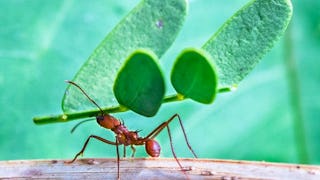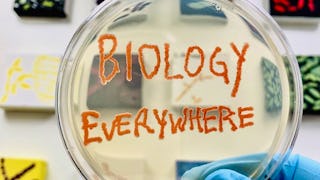Filter by
SubjectRequired
LanguageRequired
The language used throughout the course, in both instruction and assessments.
Learning ProductRequired
LevelRequired
DurationRequired
SkillsRequired
SubtitlesRequired
EducatorRequired
Explore the Natural Sciences Course Catalog
 Status: NewStatus: Free Trial
Status: NewStatus: Free TrialSkills you'll gain: Microbiology, Pharmacology, Health Disparities, Molecular Biology, Infection Control, Infectious Diseases, Chemistry, Hand Hygiene, Stress Management, Biochemistry, Psychology, Molecular, Cellular, and Microbiology, Sociology, Cultural Sensitivity, Analytical Chemistry, Immunology, Behavior Management, Biology, Decision Making, Taxonomy
 Status: Free Trial
Status: Free TrialRice University
Skills you'll gain: Biology, Environment, Microbiology, Environmental Science, Life Sciences, Environmental Issue, Sustainable Development, Natural Resource Management, Physiology, Molecular Biology, Taxonomy, Cell Biology, Anatomy, Climate Change Adaptation, Estimation, Mathematical Modeling, Scientific Methods, Climate Change Mitigation, Experimentation, Case Studies
 Status: Free Trial
Status: Free TrialDartmouth College
Skills you'll gain: Scientific Methods, Logical Reasoning, General Science and Research, Physics, Physical Science, Artificial Intelligence, Computational Thinking, Experimentation, Simulations, Computer Science, Psychology, Science and Research, Ancient History, Vibrations, Mechanics, Chemistry, Laboratory Equipment, Research, World History, Qualitative Research

University of North Texas
Skills you'll gain: Operations Management, Exploratory Data Analysis, Mediation, Change Management, Business Writing, Compensation and Benefits, Apache Hadoop, Consumer Behaviour, Organizational Change, Stakeholder Management, Event Management, Grammar, Social Media Strategy, Business Ethics, Sales Process, Diversity Awareness, Conflict Management, Research, Nutrition and Diet, Data Mining
 Status: Free Trial
Status: Free TrialDartmouth College
Skills you'll gain: Environment, Environmental Issue, Environmental Science, Demography, Energy and Utilities, Sustainable Development, Biology, Hydrology, Water Quality, Nutrition and Diet, Oil and Gas, Electric Power Systems, Systems Thinking, Water Resource Management, Natural Resource Management, Sustainable Technologies, Physics, Climate Change Mitigation, Construction, Chemistry
 Status: Free Trial
Status: Free TrialUniversity of Colorado Boulder
Skills you'll gain: Molecular Biology, Biochemistry, Human Development, Biology, Environment, Chemistry, Cell Biology, Environmental Issue, Child Development, Environmental Science, Life Sciences, Environmental Resource Management, Music, Biotechnology, General Science and Research, Decision Making, Natural Resource Management, Liberal Arts, Oncology, Sustainable Development
What brings you to Coursera today?
 Status: Preview
Status: PreviewStanford University
Skills you'll gain: Grant Writing, Peer Review, Technical Writing, Technical Communication, Writing, Scientific Methods, Journals, Editing, Grammar, Research, Proofreading, Healthcare Ethics, Media and Communications
 Status: Free Trial
Status: Free TrialUniversity of Illinois Urbana-Champaign
Skills you'll gain: Stakeholder Engagement, Environmental Monitoring, Hydrology, Community Outreach, Water Resource Management, Environmental Engineering and Restoration, Water Resources, Cultural Diversity, Policy Analysis, Social Sciences, Cultural Sensitivity, Environment and Resource Management, Environmental Laws, Environmental Engineering, Natural Resource Management, Land Management, Case Studies, Water Quality, Environmental Issue, Climate Change Adaptation
 Status: Preview
Status: PreviewNanyang Technological University, Singapore
Skills you'll gain: Systems Thinking, Case Studies, Network Analysis, Mathematical Modeling, Simulations, Social Sciences, Applied Mathematics, Policy Analysis, Agentic systems, Forecasting, Critical Thinking, Jupyter
 Status: Preview
Status: PreviewTel Aviv University
Skills you'll gain: Scientific Methods, Biology, Research, Biochemistry, Life Sciences, Psychology, Molecular Biology, Environment, Physiology, Cell Biology
 Status: Free Trial
Status: Free TrialUniversity of Illinois Urbana-Champaign
Skills you'll gain: Environmental Monitoring, Hydrology, Environmental Engineering and Restoration, Water Resource Management, Land Management, Natural Resource Management, Water Resources, Water Quality, Climate Change Adaptation, Environmental Science, Biology, Research Reports, Environment and Resource Management, Environment, Geographic Information Systems, Laboratory Testing, Geospatial Information and Technology, Technical Documentation, Microbiology
 Status: Free Trial
Status: Free TrialBanco Interamericano de Desarrollo
Skills you'll gain: Failure Analysis, Risk Analysis, Risk Modeling, Feasibility Studies, Risk Management, Project Risk Management, Analysis, Business Risk Management, Mitigation, Hazard Analysis, Disaster Recovery, Cost Benefit Analysis, Climate Change Adaptation, Civil Engineering, Data Analysis Software, Prioritization, Quantitative Research, Governance, Resilience, Environment
In summary, here are 10 of our most popular natural sciences courses
- Nursing Prerequisites: Essential Sciences for Future Nurses: Lecturio
- Introduction to Biology: Ecology, Evolution, & Biodiversity: Rice University
- Question Reality! Science, philosophy, a search for meaning: Dartmouth College
- Bachelor of Applied Arts and Sciences: University of North Texas
- Introduction to Environmental Science: Dartmouth College
- Biology Everywhere: University of Colorado Boulder
- Writing in the Sciences: Stanford University
- Wetland Science and Conservation: University of Illinois Urbana-Champaign
- Introduction to Complexity Science: Nanyang Technological University, Singapore
- Understanding Plants - Part I: What a Plant Knows: Tel Aviv University










